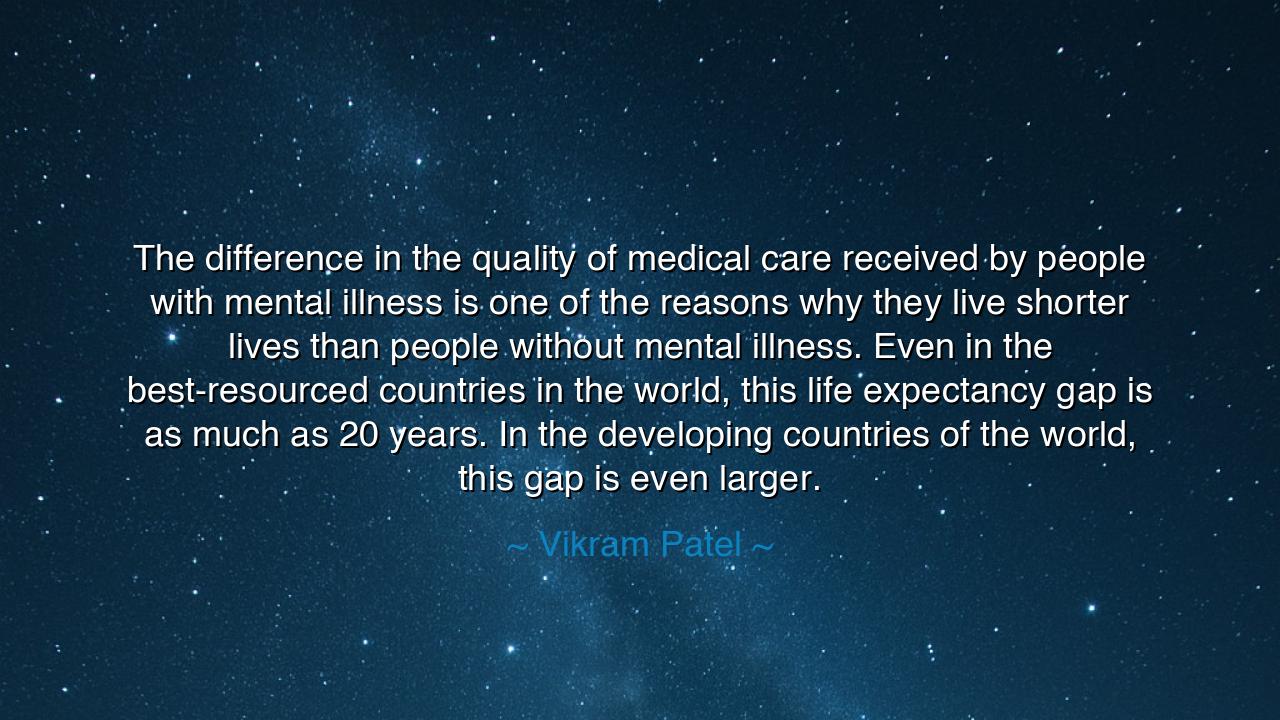
The difference in the quality of medical care received by people
The difference in the quality of medical care received by people with mental illness is one of the reasons why they live shorter lives than people without mental illness. Even in the best-resourced countries in the world, this life expectancy gap is as much as 20 years. In the developing countries of the world, this gap is even larger.






Hear the words of Vikram Patel, healer of minds and prophet of equity: “The difference in the quality of medical care received by people with mental illness is one of the reasons why they live shorter lives than people without mental illness. Even in the best-resourced countries in the world, this life expectancy gap is as much as 20 years. In the developing countries of the world, this gap is even larger.” These words fall upon us like a solemn bell, reminding us of a truth hidden in plain sight: that mental illness does not only wound the spirit, but shortens the span of life itself, through neglect, through bias, through the failure of systems meant to heal.
The origin of this truth lies in centuries of misunderstanding. The body has long been treated with reverence, while the mind, when afflicted, was often despised, feared, or ignored. Patients with mental illness have too often been cast aside, their suffering treated as less urgent than broken bones or fevered lungs. Even when care is available, it is of poorer quality, marred by prejudice or reduced by indifference. Thus, lives are not only shortened by disease, but by disparity, a wound inflicted by society itself.
Even in the wealthiest nations, Patel reminds us, the life expectancy gap reaches 20 years. Twenty years of birthdays uncelebrated, of dreams unrealized, of families bereft. In lands with fewer resources, the chasm is greater still. This is not fate, nor destiny—it is injustice. For when resources exist, yet are denied or poorly distributed, death comes not as a natural end, but as the fruit of neglect. The disparity in care becomes a silent killer, unseen by many, yet devastating in its reach.
History, too, bears witness to this neglect. In the asylums of the 19th century, patients were often confined in filth, denied proper food, hygiene, and treatment. Their bodies wasted away even as their minds languished. Contrast this with the story of Dorothea Dix, who in America fought tirelessly to reform these institutions, demanding that the mentally ill be treated with the same dignity as any other patient. Her struggle reveals both the depth of the injustice and the power of compassion to confront it. The challenge Patel describes today is the same battle, still raging in modern form.
The meaning of his words is both painful and urgent: that life expectancy itself is shaped not only by biology, but by society’s choices. When we fail to provide equitable medical care to those with mental illness, we declare—silently but powerfully—that their lives are worth less. This is not only a medical problem, but a moral failing. A civilization cannot call itself just while allowing such a vast chasm to persist between the sick of body and the sick of mind.
The lesson for us is clear: we must demand and build systems of care that honor the whole human being. Mental health cannot be treated as a shadow discipline, nor its patients as lesser citizens. Every doctor, nurse, and policymaker must remember that equity is not a luxury, but a duty. And we, as individuals, must challenge the stigma that isolates the mentally ill, for stigma itself is a form of violence that deepens the wound.
Practical action follows: advocate for mental health services in your communities, support policies that ensure equal access to medical care for all, and extend personal compassion to those who suffer silently. In workplaces, schools, and homes, create spaces where seeking help is not shameful but honored. Stand against dismissive jokes and careless language that devalue the mentally ill. For great change begins not only in institutions but in the hearts of ordinary people who choose dignity over disdain.
Thus Patel’s words are not only an observation but a call to arms. He reminds us that the battle for life is not won when food and shelter are provided, nor even when diseases are treated, but only when every human—mind and body alike—is granted equal care. Let us take up this charge, that the gap of years may close, and that no one’s life be cut short because of neglect born of prejudice. For in protecting the most vulnerable among us, we protect the humanity of us all.






AAdministratorAdministrator
Welcome, honored guests. Please leave a comment, we will respond soon